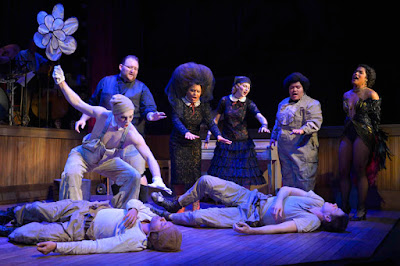Voices Come Together: Storytelling through Music in The Unfortunates
By
Cecilia Padilla and Shannon Stockwell
The plot of The Unfortunates is strange and
engaging, its visual world outrageous and meaty. But it is the emotional score
that makes the show so moving. It is the music that brings this group of
misfits together and unites them in the face of tragedy.
“St. James Infirmary”
The initial inspiration for The Unfortunates is “St. James Infirmary,” a classic blues song with mysterious origins. “It represents a morphing tradition,” says The Unfortunates music director Casey Lee Hurt. “No one knows where the thing started.”
“St. James Infirmary”
The initial inspiration for The Unfortunates is “St. James Infirmary,” a classic blues song with mysterious origins. “It represents a morphing tradition,” says The Unfortunates music director Casey Lee Hurt. “No one knows where the thing started.”
It’s impossible to know the origins of the song
because it comes out of an old European folk music tradition, which was based
on sharing songs orally. The earliest written reference to anything resembling
“St. James Infirmary” is “The Unfortunate Rake,” an Irish folk song from the
seventeenth century.
But the reference to St. James Infirmary dates the
song even earlier than that. Although it’s unclear what hospital this is
exactly, the best guess, according to music historian Robert W. Harwood, is
that it refers to a sixteenth-century infirmary in London that treated women
with leprosy. This hospital was turned into a palace by King Henry VIII in
1532, so it is likely that the song became popular before that, when the
building was still a hospital.
The score of The Unfortunates incorporates a wide range of
American musical genres, like gospel, blues, and hip-hop. The play is anchored
in these three genres, and features others such as folk, pop, jazz, and ragtime.
The result of this “hodge-podge” process is an array of infectious multigenre songs, that diverges from the traditional musical. The show’s music celebrates the old and the new by merging a venerable folk sound with contemporary hip-hop. For the Unfortunates creators, the ability to write a catchy song that’s familiar and yet fresh comes naturally—it’s not an intentional effort. “I think it’s just the nature of us as writers,” says Hurt. “We all love a really good song. In the dressing room, we sit around and make up songs all day. It’s just the way we participate with each other and communicate.”
The result of this “hodge-podge” process is an array of infectious multigenre songs, that diverges from the traditional musical. The show’s music celebrates the old and the new by merging a venerable folk sound with contemporary hip-hop. For the Unfortunates creators, the ability to write a catchy song that’s familiar and yet fresh comes naturally—it’s not an intentional effort. “I think it’s just the nature of us as writers,” says Hurt. “We all love a really good song. In the dressing room, we sit around and make up songs all day. It’s just the way we participate with each other and communicate.”
The Catharsis
The theme of unity through music appears again and again in The
Unfortunates. Big Joe finds that his suffering and pain are bearable if he
simply allows himself to become part of a community. “There’s a real
authenticity when a group of voices are joined together,” says Hurt.
Storytelling is a communal art form: the storyteller
unites a group of people through the shared experience of a narrative. In The
Unfortunates, audiences come together to hear the telling of a war hero’s
journey as related through different musical genres, genres that are all built
from communities joining together and improvising off each other. This is
something that Hurt utilizes when writing music: “Why not reach out for those
[traditions] and tell the American story at the same time we’re telling a war
hero’s story?”
Not only does the show connect individual
audience members to each other, it aims to heal divisions within society. “War
and music,” says Hurt, “are two things that, for better or for worse, America’s
always had. And there’s no question that music has always been an outcry, a
response to injustice. We sing in the hard times—in the midst of tragedy
looking for solace. But we also look for a catalyst to change things for the
better.”
*To learn more about the music in The Unfortunates, click here to purchase a printed or digital copy of Words on Plays, A.C.T.'s in-depth performance guide series. All proceeds go to our ACTsmart education programs, serving teachers and students throughout the Bay Area.


